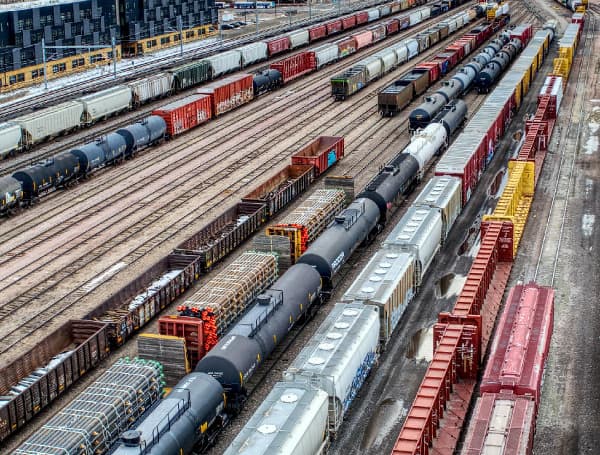President Joe Biden personally intervened in a labor dispute between unions and railroad companies on Tuesday, seeking to avert a strike that may cripple the national supply chain.
A White House official said that the president had directly called the heads of unions and railway companies, who have been locked in a months-long dispute over new contracts for workers, according to Politico.
Both sides have rejected proposals on sick time and attendance policies.
Dennis Pierce, president of the Brotherhood of Locomotive Engineers and Trainmen (BLET), which represents 57,000 railroad employees across the United States, told CNBC that “We’re just looking for time away from work to address our medical issues.”
Speaking of Union Pacific and Burlington North Santa Fe, Inc. (BNSF) the two largest Class-1 railroad companies (generating over $500 million in annual revenue), he said their “attendance policies are assessing (penalty) points to our members when they just want to take time off for their regular medical appointments.”
In the news: FBI Arrests Florida Man “Satans Child” In Horrific Child Rape Video Investigation
BLET and the International Association of Sheet Metal Air, Rail, and Transportation Workers (SMART), another union, are the last holdouts in a long negotiations process that included the International Brotherhood of Electrical Workers and the Teamsters, two other major unions, which have reached agreements for their members.
Both unions have called for reforms to these policies, even as the companies have dismissed their characterizations of their sick leave policies. In a press release provided to the Daily Caller News Foundation, Jessica Kahanek, director of media relations for the Association of American Railroads, said that impressions of poor sick leave policies by the industry are “false.”
Earlier this year, Biden created a Presidential Emergency Board of labor arbitrators to help resolve the issue by suggesting compromises to the parties. This was in addition to the legal process being conducted under the National Mediation Board, a body created by the Railway Labor Act to resolve such disputes and led by Labor Secretary Marty Walsh.
So far, both bodies have had little success producing a compromise.
In a joint statement, both Pierce and Jeremy Ferguson, president of SMART’s Transportation Division, wrote in a press release that the Presidential Emergency Board had “got it wrong” on the issue of sick leave for workers. They repeated the claim that a deal excluding sick leave extensions for workers would fail in a ratification vote by their members, which is required to effectuate any contract.
Unions will be in a legal position to strike on Friday, when companies may also begin lockouts of workers. Railway companies have warned that such a disruption would have severe consequences for the U.S. economy by preventing suppliers from shipping goods across the country at a time when supply chains are already strained.
Estimates of the cost of such action on the economy run as high as $2 billion a day, according to a report by the Association of American Railroads. Railroads haul over 28% of all freight across the U.S. and are essential to shipping raw materials and large, heavy commercial goods over long distances, per the Federal Railroad Administration.
In the news: As Food Prices Hit Record Highs, Biden Boasts Inflation Progress
There are few alternatives to rail transportation if a strike or lockout were to occur. John Esperaza, president and CEO of the Texas Trucking Association, told the DCNF that his industry is preparing for a rail strike, but said that an ongoing shortage of “over 80,000 personnel” means that increases in freight capacity will be difficult to handle.
A railroad strike or lockout could be ended by an act of Congress, which occurred in 1982 and 1986 under pressure from President Ronald Reagan. However, such a measure would require Biden’s support, placing the president in an awkward position with unions, a core political constituency in advance of November’s midterm elections. Biden has previously called himself the most “pro-union president in history.” In public remarks on Monday, House Majority Leader Steny Hoyer said that Congress would act to prevent a strike “if needed.”
The strike is already affecting various parties who rely on railway networks. Amtrak, which uses private railroads to run its passenger trains, warned of service disruptions to long-haul routes in anticipation of a strike.
The views and opinions expressed in this commentary are those of the author and do not necessarily reflect the opinion of The Free Press.
Visit Tampafp.com for Politics, Sports, and National Headlines. Support journalism by clicking here to our GiveSendGo or sign up for our free newsletter by clicking here.
Android Users, Click Here To Download The Free Press App And Never Miss A Story. Follow Us On Facebook Here Or Twitter Here.
Copyright 2022 The Free Press, LLC, tampafp.com. All rights reserved. This material may not be published, broadcast, rewritten, or redistributed.

